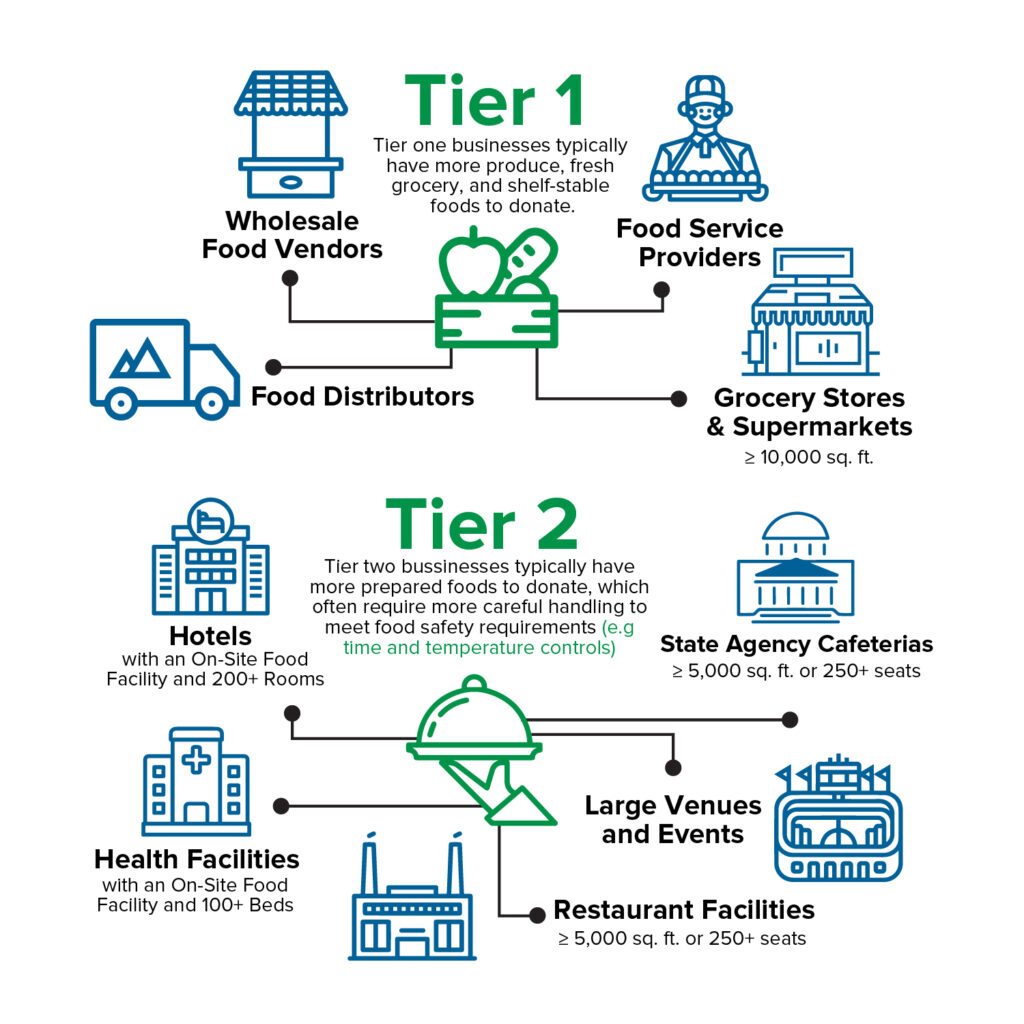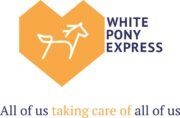The Neighbors helping Neighbors (NhN) food rescue program is a joint effort between White Pony Express and RecycleSmart, a Joint Powers of Authority (JPA) here in central Contra Costa County. NhN will launch a new platform for community service and real-time food delivery – connecting volunteers with food donations they can personally deliver to people in need.
The NhN Program is powered by ChowMatch food matching and recovery software. Sign up today in ChowMatch to learn more about donating food, volunteering for a “food run” or receiving food! ChowMatch is easy to use, and provides a real-time platform to match uneaten food to people in need right away so that no food goes to waste!
Recruiting volunteers to collect and distribute edible food is a key feature of the NhN program. Volunteers for the NhN Program can help others on their own terms, by only signing up for food runs that fit in their schedule. They will be able to work alone, driving their own personal vehicle locally, making brief stops to pickup and drop-off food donations. Volunteers that enjoy the work they are doing on behalf of WPE, will always have the option to participate in more collaborative volunteer opportunities within the organization if they should choose to.
We strongly believe our new Neighbors Helping Neighbors program is a story of community coming together to help each other.
What Is SB 1383?
SB 1383 is part of the State of California’s Short-lived Climate Pollutants Act which sets goals of:
- 50% reduction in statewide disposal of organic waste by 2020
- 75% reduction in statewide disposal of organic waste by 2025
- No less than 20% of edible food must be recovered for human consumption by 2025
Importance of Food Recovery Programs
SB 1383 requires each jurisdiction in California to implement an edible food recovery program, which will:
- Feed hungry people
- Create new green collar jobs
- Strengthen relationships between food donors and food recovery organizations
- Help create sustainable funding for food recovery organization
- Build more resilient communities
Food Recovery organizations matter more than ever to communities facing:
- High rates of food insecurity
- A public health pandemic
- Climate change impacts
For Donors to be compliant with the SB1383 goals they need to partner with a food recovery organization like White Pony Express by signing a commitment agreement to do the following:
- Make all efforts to donate any edible surplus food that you would otherwise throw out
- Implement a food recovery program in your company so that your staff understand intent of the program
- Assign a point person and a backup person to ensure food recovery program is robust
- Communicate often to ensure all parties understand the expectations and provide a courtesy period to rectify errors
- Give a month courtesy notice if you decide to switch to another food recovery program
- Please note this service is free for all donors
Tier One or Tier Two commercial businesses and agencies are required to follow the following guidelines when donating their edible food waste to organizations feeding people:
- A contract or written agreement must be maintained with food recovery service(s) or organization(s) to pick up or receive edible food
- A record must also be kept indicating all types of food being donated, pounds donated per month, frequency of donations, and the contact information of the contracted food recovery service(s) and/or organization(s)
- Generators shall not intentionally spoil food that can be recovered
- Large venues or large event operators that do not provide food services, but allow for food to be provided, shall require food facilities operating on site to comply with the above organics diversion and food recovery requirements

Other links:
https://www.calrecycle.ca.gov/organics/slcp
https://www.calrecycle.ca.gov/organics/slcp/education
Safe food donation guidelines:
https://phasocal.org/wp-content/uploads/2018/02/Safe-Surplus-Food-Donation-BMPs-for-EH_Version-2_Jan-2018.pdf
How does the law protect businesses from liability?
The “Bill Emerson Good Samaritan Food Donation Act” (Public Law 104-210) makes it easier for businesses to donate to food rescue and food bank programs. It protects donors from liability when donating to nonprofit organizations and protects donors from civil and criminal liability should the product donated in good faith cause harm to the needy recipient.
volunteer
Want to volunteer? We would love your help! Sign into our ChowMatch software on your phone as well as on your computer. After a short food safety and handling quiz, you will be able to volunteer to rescue food. Food Rescue runs will be posted on the app as food becomes available. Qualifying volunteers are required to sign and submit a liability waiver form found here.
Click here for Volunteer Sign-Up
Click here to watch instructional video
food donors
White Pony Express is currently accepting registration from restaurants and other food generating businesses and events. A list of acceptable food donations can be found here.
Click here for Food Donor Sign-Up
Click here to watch instructional video
If you are a large quantity food donor like a grocery store, please email foodrescuedonations@whiteponyexpress.org and a representative will contact you regarding on-time or weekly pickups. Tier 1 donors are not eligible to use the ChowMatch application.
Food Recipients
Recipient organizations that would like to request a food delivery should register on ChowMatch by following this link. Once registered you will be able to specify when you would like the delivery to occur and how much and what type of food you are requesting. Once you submit your request a “ping” will be sent out to the mobile phones of registered volunteers in the area. The intent of the application is that a volunteer will confirm the run and an ETA will be sent to the requesting organization.
Food Safety Guidelines
Unsuitable for Donation: Certain foods are not suitable for donation because of safety concerns. These foods include:- Alcohol (drinks with alcohol including trace amounts ex Kombucha)
- Any foods prepared, cooked, cooled or reheated at home including home canned, vacuum packed or pickled foods
- Foods previously served to consumers
- Foods in sharply dented, swollen, bulging, leaking or rusted cans
- Foods in opened or torn containers exposing the food to potential contamination
- Unpasteurized milk and other unpasteurized milk products
- Foods with an “off” odor or that show any signs of spoilage (browning, slimy layer, unusual color)
- “Distressed” foods = foods that have been exposed to fire, flooding, excessive heat, smoke, radiation, other environmental contamination
- Foods designated for discard per regulatory or donor standards
- Source of the food
- How the food was kept free from contamination during storage, preparation and transport
- How, where, and when the food was prepared
- How the food was maintained at the proper temperature
- How long the food was out of temperature control
- Common name of a dry food staple
Transporter Personal Hygiene:
- If sick, do not recover food
- Wear clean clothes and closed-toed non-slip shoes
- Remove jewelry
- Pull long hair up and/or wear a hat/hairnet
- Wear a waterproof bandage if you have a cut
- Wear single use gloves whenever handling food directly
- Wash hands and exposed arms up to your elbows with warm water and soap before handling food
- Wash hands again if you do any of the following:
- Use the restroom
- Smoke
- Touch your hair, face, clothes or body
- Handle raw meat or eggs
- Eat or drink or use cleaning chemicals
- Gloves should be worn whenever you come in contact with foods that won’t be processed before eating like whole fruit
- Wash your hands before applying gloves
- Do not eat, drink, smoke or chew gum near exposed food
- Protect food from contamination from sources such as chemicals, staples, insects, water drippage, dirty equipment, etc.
- Keep your vehicle clean of excessive dirt, insects, animals, and any other potential contaminants while transporting food
- It is a good idea to have a sheet, tarp or carry-all container that you lay in trunk or back seat before transporting any donated food. To help assure safe transportation of donated food
- Use safe, nonabsorbent, leak proof pans or reusable containers
- Never put pans containing food on the ground
- Whenever possible, use thermal bags / blankets or coolers (with ice packs for cold foods) to maintain hot or cold temperature of food; do not mix hot and cold food in the same carrier
- TCS food requires time and temperature controls to prevent the growth of microorganisms and the production of toxins. These foods contain moisture and protein. The time and temperature controls keep TCS foods safe for consumption. Donations consisting of whole produce, dry grocery items, baked goods and other similar products can be delivered anytime with no requirement for temperature controls or delivery times.
- For TCS foods including frozen foods, hot or cold prepared foods, and fresh meat, seafood and dairy the following considerations must be made:
- TCS foods must not be out of temperature controls for more than a total of 4 hours (including time during cooling, storage, transport and service)
- Whenever possible, TCS foods should be maintained below 41 ̊F or above 135 ̊F while in transport to the venue
- Any TCS food out of temperature controls for more than 4 total hours must be discarded. The Donor should check temperature when the Food Runner receives the food, using a clean and sanitized thermometer or if product is removed from a walk in refrigerator or freezer, record the temperature on the outside of the refrigerator or freezer on the Food Donation Tracking Form
- If food is inside the Food Temperature Danger Zone (between 41˚F and 135˚F) it must not be accepted by the Food Runner
- Hot food must be received by hot meal service or recipient organizations that have been preapproved to chill food properly
- All hot food must be donated at a temperature of 135°F or above and served immediately upon donation.
- Hot food out of temperature controls for any amount of time under 4 hours must be reheated to 165 ̊F before service
- Discard food if it has been below 135˚F for more than 4 hours
- Cold food must be received and held at a temperature of 41° F or below
- It is the responsibility of the donor and recipient organization to take the temperature and record the temperature of TCS foods before and after transportation, and the amount of time between locations
Food Runner Guidelines For Food Donation Pick Up & Delivery
